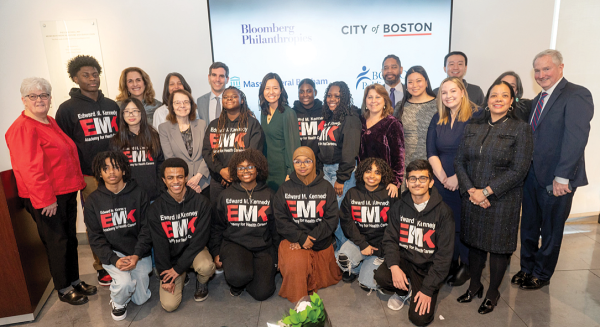January 31, 2024

Mayor Wu joined Superintendent Mary Skipper, Edward M. Kennedy Academy of Health Careers School Leader Dr. Caren Walker Gregory, Mass General Brigham (MGB) President and CEO Dr. Anne Klibanski, and leaders from Bloomberg Philanthropies at Massachusetts General Hospital on Jan. 17 to announce a new partnership between the Boston Public Schools and Mass General Brigham.
Mayor’s Office Photo by Jeremiah Robinson
Bloomberg Philanthropies has awarded the Edward M. Kennedy Academy for Health Careers a $38 million grant, the largest gift in Boston Public School history. The funding reportedly will allow the school to increase its enrollment to 800 students and partner with Mass General Brigham to create new career pathways.
The academy began in 1998 as an initiative of the Center for Community Health, Education, Research and Service (pronounced “cheers”), located at Northeastern University. How it got to that point is an interesting story.
In 1997, a representative of the High School for Health Professions located at Baylor University in Houston, Texas (now called the DeBakey High School for Health Professions) visited the Codman Square Health Center, where I was the CEO. He told me that the Baylor high school produced more African American graduates that went to medical school than any other high school in the US.
I was intrigued. For many years, I had gone to national health center conferences and heard of the great need for health professionals of color, but there was never a solution offered on how this was going to happen. I saved the materials I received from the Baylor representative in my portable file cabinet – the back seat of my car.
A month later, I was invited to an event at the Algonquin Club in Boston (now The Quin) to celebrate the new CCHERS partnership between the BU School of Medicine, Northeastern University College of Nursing, the Boston Department of Health & Hospitals, and four community health centers, including Codman Square. The partnership had received a multi-million-dollar grant from the WK Kellogg Foundation that created CCHERS and a system to have medical and nursing students trained in community health centers.
I was seated at a table with the physician who was chair of the BU School of Medicine Admissions Committee. At some point, he announced that there were more than 14,000 applicants for admission to his school. I asked him how many came from the Boston Public Schools and he laughed, saying, “I doubt any came from Boston Public Schools.”
I responded: “BU gets its property tax exempt status from Boston. You need to address this.”
Then I remembered the Baylor literature in the back seat of my car, and said, “I know exactly what you need to do!” I ran out to Newbury Street and grabbed the materials in my car and ran back and threw them on the table, saying, “You need to start a high school for health professions.”
The BU official said, “I have nothing to do with that. I’m just the admissions chair,” to which I asked, “Well, then, who do I need to speak with?” He said that I needed to speak with the dean.
I set up a meeting with the dean at the BU School of Medicine dean and we met a week or so later, where I told him that Baylor University had a high school that produced students of color who went on to medical school and that BU should copy that model. He told me it wasn’t their responsibility, so I asked, “Whose responsibility is it then?” He answered, “I don’t know, but it isn’t ours.”
With that response, I approached Pat Meservey, executive director of CCHERS, who had been an innovative nursing dean and later president of Salem State University. He loved the idea, and over the next week or so, Pat, her staff at CCHERS, BPS educator Linda Walczak, and I got together to write up the application for what we called Health Careers Academy.
It was approved by the state and opened in 1998, eventually winding up in a building owned by Northeastern University, the other academic partner of CCHERS. It is what is called a Horace Mann Charter School, part of the Boston Public Schools but with greater autonomy. It has been very successful. I look forward to learning more about how the school will use its $38 million grant.
Boston’s health care system is a gigantic part of our economy, with 18 percent of the region’s jobs. Health professions pay middle class wages, so I submit that becoming a health professional is the most promising way to go from poverty to the middle class.
Boston needs more schools that prepare students for opportunities in health care professions. Codman Academy is one example. Located inside the Codman Square Health Center, students participate in paid internships, earn college credits, get certification as pharmacy technicians and other allied health credentials. Codman students also attend a high school seminar, Harvard Med Science, on the campus of Harvard Medical School.
Boston is the rare city with three medical schools. Their work falls short without a commitment to grow doctors of color on their home turf. Imagine if Boston’s medical schools collaborated on a high school like the successful Baylor model? It would be a wonderful gift to our city.


